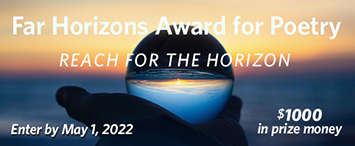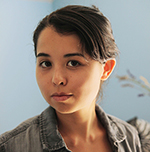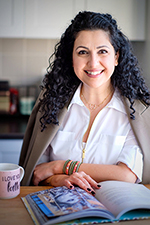Early Bird discount—$10 off!

Calling all emerging writers—this contest is specifically for those who have yet to publish a book of poetry. Submit your poem(s) by May 1 at 11:59pm PDT. One winner will take home the CAD $1,000 prize! Plus, if you enter by March 31, you'll get an Early Bird discount of $10 off your initial entry fee.
This year's judge:
Laura Ritland
Early Bird discount entry fee until March 31, 2022 (includes a one-year print subscription):
$15 CAD for each entry from Canada
$25 CAD for each entry from elsewhere
$15 CAD for each
additional entry, no limit!
Full contest guidelines on our website.
Far Horizons Award for Poetry: interview with judge Laura Ritland
 Malahat Review volunteer Claire Majors talks with the Far Horizons Award for Poetry judge (and previous winner) about the constructed nature of poetry, the benefits of form constraints, and how elastic and capacious craft can be. Malahat Review volunteer Claire Majors talks with the Far Horizons Award for Poetry judge (and previous winner) about the constructed nature of poetry, the benefits of form constraints, and how elastic and capacious craft can be.
CM: What are you looking for in the winning poem? What will be the deciding factor between the shortlisted entries and the winning entry?
LR: I’ll be looking for how the way the poem is made, its particular construction, feels more than just a demonstration of an idea, story, or concept—feels irrefutably alive in itself. And I’m also looking for risk: whether that be in the use of craft or in the kind of story that it tells.
The most exciting poetry, I’ve found, just doesn’t take for granted the relation between form and content, showing and telling—it finds its own way through the binary, whether that be in finding an extremely beautiful formulation between the two or shaking up language itself.
Read the rest of Laura Ritland's interview.
winter issue interview with Nataly Shaheen on cnf
 Malahat Review Creative Nonfiction Editorial Board member Serena Lukas Bhandar talks with the winter issue #217 contributor about her upcoming memoir, realizations she had after writing about her mother, and immersing herself in the time and place from her memories—the Lebanese Civil War. Malahat Review Creative Nonfiction Editorial Board member Serena Lukas Bhandar talks with the winter issue #217 contributor about her upcoming memoir, realizations she had after writing about her mother, and immersing herself in the time and place from her memories—the Lebanese Civil War.
SLB: “Ali-Mohammad” offers immediacy and vulnerability as we see events unfold through your eyes as a child. How did it feel to inhabit your childhood self in the work of crafting these scenes?
NS: Sometimes, I recollect certain incidents that continue to feel immediate and real, not distant in time and place. However, there are times when I shy away from being that little child again. Some of the memories of war are triggering. I have written some pieces that only seemed to scratch the surface, where it felt like I was running through the events and avoiding the emotions and the human impact. In those instances, my craft suffers because I rush to include multiple points of view or timelines that do not make sense, anything to keep me from connecting with that little girl who bore witness to tragedies. The rewriting process here is essential. The challenge is to allow that little girl to speak, to exist again, to feel the pain. When she emerges, I walk in her steps and look through her eyes. What does she see? What does she feel? Her eyes become the camera that is looking outward and inward at the same time. And I ask myself, why do I now, after decades of these events, still remember this? These questions then guide the writing and hopefully make it more authentic. Writing from this perspective can be emotionally exhausting but also therapeutic.
Read the rest of Nataly Shaheen's interview, as well as an excerpt of "Ali-Mohammad."
|
|
|
|
|
|
|
|